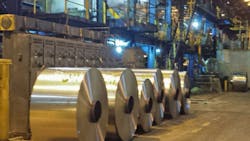Cleveland-Cliffs CEO Cooking Up Plan B for Idled West Virginia Plant
A West Virginia tinplate plant recently idled by Cleveland-Cliffs Inc. could be revived as a hub for electric transformer manufacturing, Cliffs Chairman, President and CEO Lourenco Goncalves said April 23.
Goncalves and his team indefinitely halted production at their Weirton plant April 11, a decision the company’s boss said he had to make after the International Trade Commission overruled a U.S. Department of Commerce recommendation that tinplate imports be slapped with a range of duties. The decision left more than 900 people without a job, although more than 100 of them have since relocated to other Cliffs plants.
But Cliffs isn’t prepared to walk away from its site on the Ohio River about 30 miles west of Pittsburgh. Goncalves said he has been talking to some of his customers that make transformers about adding capacity to a market that’s been tight for several years as electrification investments have soared. (More via this story from fellow Endeavor Business Media brand T&D World.) Among the options: A new Weirton plant to make the grain-oriented electrical steel used in transformers.
“We can co-invest [or] we can just support with the steel. We can do whatever it takes,” Goncalves said. “But we need to increase the throughput and the availability of transformers for the supply chain, made-in-USA transformers and hopefully with union workers. That’s what we are working on, and we believe we’re going to be successful.”
Goncalves outlined his rough plan for Weirton during a conference call discussing Cleveland-Cliffs’ first-quarter results, which showed a net loss of $53 million on revenues of $5.2 billion. (A year earlier, those numbers were a net loss of $42 million and $5.3 billion, respectively.) The company’s results included $177 million in one-time costs related to the Weirton plant’s closure and also reflected lower demand from distributors who held off from buying to work down inventories built up during the United Auto Workers’ strike of major auto manufacturers last fall. Adjusted EBITDA, which doesn’t include those items, climbed to $414 million from $243 million in early 2023.
Goncalves said service-center customers have returned to the market of late and, combined with ongoing strong demand from automotive customers, will help Cleveland-Cliffs’ shipments climb back above 4 million in the second quarter. That more traditional product mix also will lower the company’s average selling price, however.
Goncalves’ peers at Nucor Corp. are also expecting lower average prices in the spring quarter. Speaking after they reported Charlotte-based Nucor’s Q1 results—$845 million of net earnings on sales of more than $8.1 billion—CEO Leon Topalian and his team said demand generally is holding up well and noted that customers in the advanced manufacturing, data center and infrastructure sectors are still benefiting from longer-term tailwinds. But demand has begun to normalize from the go-go quarters coming out of the deepest part of the pandemic.
“Markets are moderating,” Topalian said. “We’re expecting Q2 to be a little softer, but […] it’s relative. I still think there’s going to be many of our product groups that are going to generate very robust returns for us and our shareholders.”
Investors didn’t seem in the mood to hear “relative” talk: The shares of both Nucor (Ticker: NUE) and Cleveland-Cliffs (Ticker: CLF) were big losers on a day when the benchmark Standard & Poor’s 500 Index rose 1.2%. However, both are still up smartly over the past six months.
About the Author
Geert De Lombaerde
Senior Editor
A native of Belgium, Geert De Lombaerde has been in business journalism since the mid-1990s and writes about public companies, markets and economic trends for Endeavor Business Media publications, focusing on IndustryWeek, FleetOwner, Oil & Gas Journal, T&D World and Healthcare Innovation. He also curates the twice-monthly Market Moves Strategy newsletter that showcases Endeavor stories on strategy, leadership and investment and contributes to other Market Moves newsletters.
With a degree in journalism from the University of Missouri, he began his reporting career at the Business Courier in Cincinnati in 1997, initially covering retail and the courts before shifting to banking, insurance and investing. He later was managing editor and editor of the Nashville Business Journal before being named editor of the Nashville Post in early 2008. He led a team that helped grow the Post's online traffic more than fivefold before joining Endeavor in September 2021.
